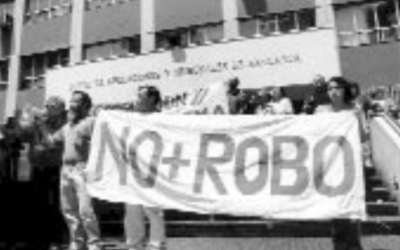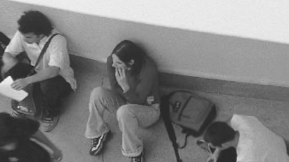Homosexual in Chile Today
Lights and Shadows

Scenes from gay pride parade in Santiago. Photo by Cristina Abad Angel.
Homosexual advocacy organizations appeared at the end of the 1980s as a social response to the HIV/AIDS epidemics and the fight for democracy. Homosexual groups such as Liber-H began in a town in the central region of Chile, Paine, a place scarcely affected by the political repression during the military dictatorship. In 1987, the Corporación Chilena de Prevención del SIDA came into existence as a collective response to the HIV/AIDS epidemic. A constellation of organizations soon emerged on the scene: the so-called “Historic” MOVILH, MUMS, the Movimiento Unificado de Minorías Sexuales and more recently, Traves Chile. Lesbian organizations have forged their own way in a certain dialogue of inclusion and distinct autonomy in relation to male homosexuals. They have built their own social organizations and created their own ways of communicating.
The Chilean homosexual today finds expression in this proliferation of civil society organizations and lively Gay Pride parades. Legal restrictions on sexual relations between persons of the same sex have been removed from the books. As in the rest of Latin America, the number of publications and studies on sexuality and gender issues has increased. Certain topics such as sexual diversity and the HIV/AIDS epidemic have been integrated into the public agenda. Radio and television have begun to broadcast positive reflections of homosexual life. Literature often deals with issues of homosexual identity.
Gay, lesbian and transgender social organizations, as well as a thoughtful academy, civil society stakeholders and public state-controlled services, have placed homosexuality in the context of its cultural significance. Chilean writer and cultural critic Juan Pablo Sutherland, referring to the proliferation of writing on the homosexual issue, commented, “The advancement of the Chilean lesbian- homosexual movement and the visibility of its proposals have accustomed the public and the society in general to these outbursts generating at times significant discussions regarding cultural—and not just literary—production.”
In spite of recent advances in terms of political and cultural spaces, the homosexual in Chile today faces many challenges, including persistent homophobia. These shadows include discrimination, exclusion and identity issues that reflect the sometimes hostile environment. For example, in 2003, Chileans vehemently discussed whether homosexuals should have the right to donate blood for blood banks. Those opposed argued that homosexuals would donate HIV-infected blood, resulting in possible death for innocent persons. The underlying implication, of course, was that all homosexuals are AIDS-carriers. Blood banks ended up accepting blood donations from homosexuals, but shadows of prejudice against this kind of donation still linger.
Another recent case involved public knowledge about the homosexuality of a judge in charge of an investigation related to a pedophilia case. The case caused intense debate in the media as to whether homosexuals should be allowed to serve as judges, an issue that finally had a positive outcome with the judge confirmed in his position. But in this case, as in the one mentioned above, it is still possible to feel the violent tone of certain attitudes. The Chilean backlash, or homophobic reappearance, can be placed in a larger context, including the continent’s economic globalization that has resulted in transformations of the cultural map of Latin America. National social and political aperture and regional integration have led countries such as Chile to insert themselves competitively in the global market. Thus, the public expression of sexual diversity becomes more difficult because of the inclusion of new meanings that not only can be ascribed to the countries themselves, but to the integration and exclusion process that globalization generates (García Canclini, 1995; Brunner, 1998).
MEDIA, POLITICS AND GAY PERFORMANCE
The globalization of communications requires theoretical and empirical research. This is particularly true of cases specifically related to media and information technologies and lesbian/gay and transgender persons or groups, In Chile, the relation between media— television, radio and press—and the gay/lesbian organizations is paradoxical. At the same time media discusses homosexual presence in terms of its symbolic and critical transgression, the gay issue is flourishing in its positive performance in the areas of entertainment and literature.
The perception of homosexuality as transgression in the mainstream news media reflects major trends in public opinion. In a 1998 FLACSO survey, 60% of men and women 18 years and older in Santiago considered interviewing prostitutes and/or homosexuals on television an unacceptable practice. This attitude contrasts paradoxically with the positive portrayal of homosexual issues or homosexuals as characters in television entertainment programs that elude direct or explicit criticism.
One recent example of this paradox was the television series Machos, the most successful soap opera in Chilean history, recently exported to Spain. Although we never saw the character’s boyfriend or any intimate contact between men, his love and loss and his struggle for family acceptance captured the Chilean audience. Eventually everyone accepted him, including his overly macho father and brother, a direct negation of the transgression message perpetuated in the news media. Perhaps most important, the protagonist was not a stereotypically gay character in the vein of Will and Grace and Queer Eye.
The Chilean alternative media have been encouraging non-stereotypical images of homosexual presence for much longer. The radio program “Triángulo abierto,” on the air since 1993, allows the broadcast of different types of journalistic venues, including the participation of lesbian/gay movement public speakers and the presence of homosexuals or homosexual themes from the academy, politics and culture. (See http://www.orgullogay.cl/triang.htm
HOMOPHOBIA
Despite some positive images in the media and the increase in homosexual civil society representation, there still exist important levels of public rejection of the visible presence of homosexuals in Chile. A series of surveys and qualitative studies have shown that the majority of Chileans tends to reject homosexual men when they are part of institutions such as schools, army, television and politics. Fundación Ideas, a Chilean non-governmental organization, studied issues of intolerance and discrimination issues in persons 18 years and older. The 1997 study found that homosexuality topped the list of groups mentioned in terms of intolerance and discrimination, a much higher level than ethnic discrimination, for example. Subsequent studies continue to show high levels of homophobia, even though certain categories experienced a significant decrease in homophobic attitudes. For example, only half of those interviewed a 2003 survey approved the statement: “Medical doctors must study the causes for homosexuality, in order to prevent their continuing birth” (Chilean Government, 2003).
Homophobia results in serious lesbian and gay human rights in Chile. Modification of legal regulations has not necessarily guaranteed the pacific and respectful co-existence with homosexual persons and groups in our country. We lack the educational, communication and judicial strategies to allow for the restitution of homosexual dignity as persons and citizens. Illegal arrests and intimidation continue. Social stereotypes and restrictions persist, hindering the possibility of filing a suit in defense for acts of discrimination and defamation committed against gay, transsexual or lesbian persons (Ahumada y Sánchez, 2000).
Homosexual stakeholders in Chile have filed 66 denunciations for discrimination in 2003 (MOVILH, 2003). Sociocultural and economic inequities are also reflected in the definition of homophobic behavior and ways of living homosexuality. Poor homosexuals experience more violent and aggressive behavior. On April 12, 2003, the transgender organization Traves Chile publicly reported that a gang of 30 men wielding knives and guns attacked their headquarters in downtown Santiago, when they were having a party. In the act the transsexual Alejandra Soto was stabbed.
The homophobia and its violent consequences, of course, are not exclusive to Chile. Amnesty International (1994) refers to extrajudicial executions and forced disappearance of persons identified as homosexuals throughout Latin America. These grave basic rights violations are intertwined with police control and repression in entertainment venues such as discotheques and bars throughout the hemisphere (Montalvo, 1997).
GAY, LESBIAN AND TRANSGENDER IDENTITY AS A POSSIBILITY
The importance ascribed to the sociocultural, political or legal context of the different manifestations of homosexuality in Chile is not the result of a mere analytical exercise, but a consequence of the possibilities of living/experiencing homosexuality. Under the present conditions, self identification as a homosexual or bisexual person is very low. In a survey on these issues in Chile, less than 3% of the population identified itself as homosexual or bisexual. Contradictorily, the very low rate of homosexual or bisexual self-identificatiion does not correspond with epidemiological facts. A study on HIV transmission through sexual exposure in 1999 found that 71% of the cases were homosexual or bisexual men (Gobierno de Chile-Ministerio de Salud, 2000). Then, based on official numbers, the question of who are homosexuals in Chile is still pending.
In the 1990s we can find many ways of representing identities in the field of sexual diversity and the multicultural richness of the different countries in the region. Each term—“lesbian,”“sissy,” “homosexual” or “gay”—has a specific recognized meaning that does not correspond to mere technical descriptions of behavior and varies from country to country. For example, the term “lesbian” agglutinates a constellation of identities and affective and sexual experiences of women that can be considered alien to certain cultural or linguistic contexts. This also has to do with such cultural generalizations about the “Latin American man” or the “macho latino,” ignoring the differences, complexities and subtleties of masculinities and everyday experiences of men (Ramírez, 1993; Gutmann, 1996).
The possibilities of building a homosexual-lesbian and transgender identity must be seen in the context of individual processes and family arrangements of inclusion or exclusion. Under a market/ consumer logic we can find social areas as bars, discotheques and other meeting places that offer various types of sociability. Moreover, social organizations have given legal standing to basic ways of knowledge and acknowledgment of being homosexual in Chile. Literature also has something to say, as we can see in Pedro Lemebel’s Manifiesto(Hablo por mi diferencia), Loco Afán, crónica de un sidario:
“En Nueva York los maricas se besan en la calle
Pero esa parte se la dejo a usted
Que tanto le interesa
Que la revolución no se pudra del todo
A usted le doy este mensaje
Y no es por mí
Yo estoy viejo
Y su utopía es para las generaciones futuras
Hay tantos niños que van a nacer
Con una alita rota
Y yo quiero que vuelen, compañero
Que su revolución
Les dé un pedazo de cielo rojo
Para que puedan volar”.
As the writer suggests, the future in Chile may allow a more true liberation for Chilean homosexuals.
RESOURCES
- Corporación Chilena de Prevención del SIDA (http://www.sidaccion.cl)
- “Historic” MOVILH (http://www.naciongay.cl)
- MUMS Movimiento Unificado de Minorías Sexuales (http://orgullogay.cl)
- Traves Chile (http://www.traveschile.cl)
- Lesbian organizations (http://www.rompiendoelsilencio.cl)
Spring 2004, Volume III, Number 3
Gabriel Guajardo is a Chilean anthropologist with years of experience in research. One of his main topics refers to homosexuality and gender issues. A bibliography for this article can be found at http://drclas.fas.harvard.edu/publications
Related Articles
Poverty or Potential?
Teresa stops me three blocks from Nueva Imperial’s main plaza on a quiet Wednesday morning, eager to chat. She is wearing a light blue sweater and a matching blue headband glowing slightly against her dark black hair.
Editor’s Letter: Chile
I was hesitant to do an issue on Chile when I had other topics broader and richer in content. Although in a way Chile seems like an obvious choice because of the DRCLAS Regional office there, I felt there were other priorities in terms of substance.
Three Students, Three Experiences
I was extremely impressed with how successful the Chilean health system has been in improving the health of its citizens despite its limited resources. Its success, however, in many…




